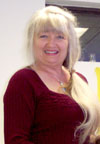 The small Southern California town of Idyllwild, in the San Jacinto Mountains above Palm Springs, is about two and a half hours east of Los Angeles. The town is a mile high, not incorporated, and is home to about 3,000 permanent residents. I began spending time here in early 2006, when I met Anna Bielecki and then wrote the following about the nutritionist, chef, and “personal health coach” in Idyllwild. Anna Bielecki died on January 13, 2013. This is the first of a series of posts called Mountain Stories. Text and photo copyright Paula Panich, 2012.
The small Southern California town of Idyllwild, in the San Jacinto Mountains above Palm Springs, is about two and a half hours east of Los Angeles. The town is a mile high, not incorporated, and is home to about 3,000 permanent residents. I began spending time here in early 2006, when I met Anna Bielecki and then wrote the following about the nutritionist, chef, and “personal health coach” in Idyllwild. Anna Bielecki died on January 13, 2013. This is the first of a series of posts called Mountain Stories. Text and photo copyright Paula Panich, 2012.
February 2, 2006
Last night, for dessert, I had a small piece of carrot cake cut from a plain sheet cake fresh from the pan. It was made from a recipe of the grandmother of Jessie, who is Anna’s young culinary assistant.
Anna runs two restaurants in Idyllwild. One, Mozart House, is open on weekends, and the other is Nature’s Wisdom, open seven days a week. This is the restaurant I frequent daily, usually for lunch, otherwise knowing no one at all in Idyllwild, I would sit at my keyboard and not speak to another human being all day.
I hesitated slightly when I saw the sign for Nature’s Wisdom, which has a very small cross on it. Having been boxed in during my youth by unwanted proselytizing, I prefer to have my lunch straight, thank you very much. But the only real proselytizing that happens at Anna’s, as I now call the restaurant, has to do with the faith in the power of unadulterated and organic foods, and then only if you ask for it.
I had stopped by Anna’s yesterday afternoon to pay my debt from the day before. My debt was a result of the malfunctioning of the two ATM machines in Idyllwild —no machines, no money for a visitor. Anna accepts only cash. Never mind, she had said, pay me tomorrow. That is what occasioned my luck in arriving the moment the carrot cake came out of the oven.
She had not remembered the $30 debt. As I plunged into the kitchen just behind the cash till to get a look at the cake, she said she and Jessie had made it as an experiment as a customer had asked her to bake a birthday cake. Was it festive or sweet enough to serve at a party? She wanted to know. “Everything is organic,” she said, “the carrots, the flour, the sugar — but not the cream cheese.” I had the feeling she considered this a personal failure.
Just then an expectant boy of ten or eleven rushed in, his eyes never moving from Anna’s face. She cut a piece of cake, frosted it, and handed to him. He almost flew toward the door, Anna calling after him, “You can get a napkin, if you want!” He stopped in flight, grabbed a paper napkin from a stand next to the big glass-fronted refrigerator, and fled, without saying a single world.
The carrot cake was good, honest, moist, fragrant. When I asked to take some home, Anna carefully wrapped a piece and handed it over along with a small plastic container of cream cheese frosting. (No soggy cake on her watch.)
My bill was $32.50, and I handed her two twenties. Most of the change went into the glass vase with the little sign spelling out the word KARMA. Anna does not take anything from this jar, leaving it for the young people in her employ.
She asked me how the supplement was working out (the cause of my debt from the previous day), and I said in fact it was working out. I had bought a jar of something called SPS 30, “mucolytic enzyme formula,” after I had mentioned a sinus-y headache, and Anna had walked to a far shelf and pulled down this small container. By this time I was three weeks under Anna’s spell, and shook off my prejudices and history, and bought the capsules. (I do feel better, though I have thrown out more “supplements” over the years to fill a small Dumpster.)
I pick up the cake, cream cheese, and three organic oranges from a box on the floor (three for a dollar). Then Anna asks me about the misfiring ATM machines. How do they work? You mean no one stands behind them making them work?
She laughs. “I’m a technology dinosaur.”
I told her someone does replenish the money in the machine, but the rest was computerized.
“I remember listening to music on the radio when I was five,” she says.
This was in Czechoslovakia, in 1955. Her head is cocked to one side as she recalls this, and I can easily see the blonde child she was trying to peer into the music-making apparatus.
“I was trying to imagine the tiny violins and the other instruments, and those tiny people playing them,” she says. “How could they have possibly fit into this box?”
She still wonders at her wonder.
